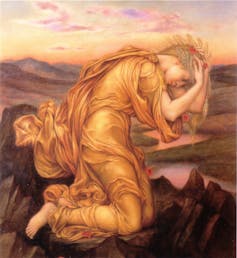The student of Greek mythology is often struck by the fact that some gods and goddesses have extensive roles in the mythical narratives, and others have very limited parts to play. The goddess Demeter is an interesting case of this. As an Olympian goddess and fertility figure, she is very important in ancient Greek religion and life, but she has a rather small role in its literature and mythology.
She is mentioned a little bit in Homeric epic, especially the Iliad, but has no actual part to play either in the Iliad or the Odyssey. Nor does she feature at all as a character in extant Greek drama.
There is, however, a rather beautiful poem called the “Homeric Hymn to Demeter” in which Demeter and her daughter Persephone are the central focus of attention. It probably dates to the first half of the 6th century BC. It is 495 lines long and composed in hexameters, the same poetic metre as the Iliad and Odyssey. Despite its connections to epic poetry, however, and the title “Homeric”, the hymn is of uncertain authorship.
A mother’s love
The focus of the poem is one of the most renowned narratives from Greek mythology – the rape of Persephone by Hades, the god of the Underworld, and the response of Demeter to her loss. It is a remarkable narrative, built fundamentally on the power of a mother’s love for her only child.

The ancient Greek word for “mother” [meter] is actually embedded in Demeter’s name. The Hymn describes the primordial maternal power brought to bear upon the male sky-god Zeus, who had secretly (ie without Demeter’s knowledge) given over his daughter Persephone to a marriage with his brother Hades.
Demeter is one of the “older” generation of Olympian gods. Her siblings are Zeus, Poseidon and Hades on the male side, and Hera and Hestia on the female side. Zeus, the sky god, has sexual relations with two of his sisters – Hera, who is a kind of long-suffering queen of heaven; and Demeter, who is more earth-focused. In a famous passage in Iliad 14, Zeus recounts to Hera herself some of his sexual exploits, and he names Demeter in his long list of amours.
Persephone is not mentioned in the passage as the product of this particular sexual encounter, but that is definitely the idea. Demeter and Persephone are often thought of together as “The Two Goddesses”. This name helps to emphasise the power of their bond, and the gravity of Zeus’s action in violently separating them.
The Hymn tells the story of Persephone and other young girls gathering flowers in a meadow. As she bends down to pick a beautiful flower, the earth opens up and Hades emerges on his horse-drawn chariot. She gives out a scream, but he carries her off into the depths of the earth.
